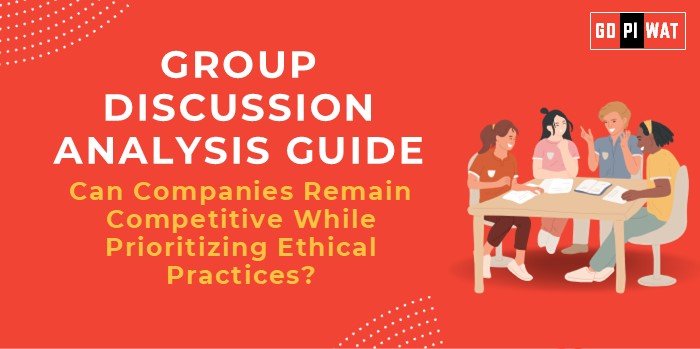📋 Group Discussion Analysis Guide
🌟 Topic: Can Companies Remain Competitive While Prioritizing Ethical Practices?
🌐 Introduction to the Topic
Opening Context: “In an era of conscious capitalism and global competition, ethical practices are no longer optional but essential. Companies today must navigate a complex landscape where success is defined not just by profits but also by trust, transparency, and sustainability.”
Topic Background: The discussion around ethics and competitiveness gained prominence with increasing consumer awareness, regulatory scrutiny, and the focus on Environmental, Social, and Governance (ESG) frameworks. Globally, businesses such as Patagonia, Tesla, and TOMS have shown that ethical practices can co-exist with competitive success, reshaping traditional corporate strategies.
📊 Quick Facts and Key Statistics
- 87% of Consumers: Prefer to buy products from companies that advocate for social or environmental causes (Forbes, 2023).
- Employee Retention: Ethical companies reduce turnover by up to 50% (Harvard Business Review).
- ESG Investments: Surpassed $30 trillion in 2023, signaling a strong preference for ethical organizations (Bloomberg).
- Consumer Trust: Ethical scandals reduce long-term brand value by up to 30%.
- Competitive Advantage: Companies like Patagonia and Unilever saw 10–15% annual growth due to ethical initiatives.
🔑 Stakeholders and Their Roles
- Corporate Leaders: Set ethical standards, ensuring alignment between profits and values.
- Consumers: Drive demand for ethically-produced goods and services.
- Governments and Regulators: Enforce laws and policies to prevent unethical practices.
- Employees: Seek workplaces that reflect ethical cultures and shared values.
- Investors: Prioritize ESG-compliant companies for sustainable long-term returns.
📈 Achievements and Challenges
Achievements
- Consumer Loyalty: Ethical businesses like Unilever’s “Sustainable Living” brands account for 70% of its revenue growth.
- Improved Profit Margins: Companies adopting ethical sourcing often attract premium pricing (Fairtrade products).
- Investor Confidence: ESG-focused funds outperformed the broader market by 8–10% in 2023.
- Brand Reputation: Ethical policies help companies recover faster from crises, as seen with Starbucks’ improved public perception post-reforms.
Challenges
- Short-Term Costs: Ethical supply chains and sustainability initiatives can increase costs, reducing competitiveness.
- Market Pressures: Firms in highly competitive industries may struggle to prioritize ethics over profitability.
- Global Disparities: Variations in regulatory standards can disadvantage ethical companies operating internationally.
🌍 Global Comparisons
- Patagonia (USA): Prioritizing sustainability and fair wages while achieving consistent growth.
- Volkswagen (Germany): Suffered a $30 billion loss in market value due to the Dieselgate scandal.
- Case Study – TOMS Shoes: Implemented its “One for One” model, donating shoes for every purchase. Despite initial costs, the company garnered immense consumer loyalty, achieving global recognition.
🔍 Structured Arguments for Discussion
- Supporting Stance: “Companies can maintain a competitive edge by aligning ethics with consumer values, as seen with Unilever’s sustainable product lines driving 70% of growth.”
- Opposing Stance: “While ethical practices are ideal, companies in price-sensitive industries struggle to balance costs, threatening their competitive advantage.”
- Balanced Perspective: “Ethical practices pose initial challenges but deliver long-term competitive benefits in brand loyalty, investor trust, and operational resilience.”
📌 Effective Discussion Approaches
- Opening Approaches:
- Use compelling statistics: “87% of consumers favor ethical companies—ignoring ethics risks market share.”
- Start with a case study: “Volkswagen’s Dieselgate scandal cost it billions, proving that unethical shortcuts erode competitiveness.”
- Counter-Argument Handling:
- Acknowledge short-term cost challenges.
- Highlight examples of companies overcoming cost barriers (e.g., Fairtrade certification enabling premium pricing).
- Emphasize long-term gains like consumer trust and investor appeal.
🔧 Strategic Analysis of Strengths and Weaknesses
- Strengths: Enhances brand reputation and loyalty, attracts purpose-driven investors and talent, ensures regulatory compliance.
- Weaknesses: Short-term cost implications, competitive pressure in cost-sensitive markets.
- Opportunities: Rising ESG investment trends, growing consumer demand for ethical products.
- Threats: Global disparities in regulations, greenwashing allegations damaging ethical brands.
💼 Connecting with B-School Applications
- Real-World Applications:
- Use examples like Unilever’s sustainability strategy or Patagonia’s environmental initiatives for business strategy projects.
- Explore cost-benefit analysis frameworks to assess ethical policies in operations or supply chain management.
- Sample Interview Questions:
- “How can ethical practices drive competitive advantage in a price-sensitive industry?”
- “What role does ESG play in modern corporate strategy?”
- Insights for B-School Students: Ethical leadership fosters sustainable business models. Balancing ethics with profits requires strategic innovation and stakeholder engagement.


